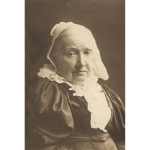I
Prodigal, what were your wanderings about?
The smoke of homecoming, the smoke of departure.
The earth grew music and the tubers sprouted
to Sesenne's singing, rain-water, fresh patois
in a clay carafe, a clear spring in the ferns,
and pure things took root like the sweet-potato vine.
Over the sea at dusk, an arrowing curlew,
as the sun turns into a cipher from a green flash,
clouds crumble like cities, the embers of Carthage;
any man without a history stands in nettles
and no butterflies console him, like surrendering flags,
does he, still a child, long for battles and castles
from the books of his beginning, in a hieratic language
he will never inherit, but one in which he writes
"Over the sea at dusk, an arrowing curlew,"
his whole life a language awaiting translation?
Since I am what I am, how was I made?
To ascribe complexion to the intellect
is not an insult, since it takes its plaid
like the invaluable lizard from its background,
and if our work is piebald mimicry
then virtue lies in its variety
to be adept. On the warm stones of Florence
I subtly alter to a Florentine
till the sun passes, in London
I am pieced by fog, and shaken from reflection
in Venice, a printed page in the sun
on which a cabbage-white unfolds, a bookmark.
To break through veils like spiders' webs,
crack carapaces like a day-moth and achieve
a clarified frenzy and feel the blood settle
like a brown afternoon stream in river Doree
is what I pulsed for in my brain and wrist
for the drifting benediction of a drizzle
drying on this page like asphalt, for peace that passes
like a changing cloud, to a hawk's slow pivot.
II
In the vale of Santa Cruz I look to the hills.
The white flowers have the fury of battle,
they lay siege to the mountains, for war
there is the tumult of the white ravines,
and the cascade's assault; they bow their plumes,
Queen Anne's lace, bougainvillea, orchid and oleander,
and they are as white as arrested avalanches,
angry and Alpine, their petals blur into
a white gust from the Matterhom or the streets of Zermatt.
Both worlds are welded, they were seamed by delight.
Santa Cruz, in spring. Deep hills with blue clefts.
I have come back for the white egrets
feeding in a flock on the lawn, darting their bills
in that finical stride, gawkily elegant,
then suddenly but leisurely sailing
to settle, but not too far off, like angels.
III
I wake at sunrise to angelic screams.
And time is measuring my grandchildren's cries
and time outpaces the sepia water
of the racing creek, time takes its leisure, cunning
in the blocked hollows of the pool, the elephantine stones
in the leaf-marked lagoon, time sails
with the soundless buzzard over the smoking hills
and the clouds that fray and change
and time waits very quiet between the mountains
and the brown tracks in the valleys of the Northern Range,
a cover of overhanging bamboo, in Maraval
where, if the bed were steeper, a brown stream races
or tries to, pooling in rocks, with great avail
for me at least, or where a range's blues
and indigo over which wide hawks sail
their shadows on the wells of Santa Cruz,
dark benedictions on the brook's muttering shale,
and the horses are slowly plunging their manes
as they climb up from the paved-with-lilies pond,
so much mythology in their unharnessed necks!
These little things take root as I add my praise
to the huge lawn at the back of the house, a field,
a bright, unaltered meadow, a small savannah
for cries and bicycles and joy-crazed dogs
bolting after pedalling boys, the crescent ghost
of the new moon showing and on the thick slopes
this forest like green billowing smoke
pierced by the flame petals of the immortelle.
IV
Petals of the flame tree against ice-cream walls
and the arches across the park with its tacit fountain,
the old idlers on the benches, this is the prose
that spreads like the shade of an immortal banyan
in front of the library, the bulk that darkens
the violin of twilight when traffic has vanished
and nearly over also the colonial regime when the wharves
cradled the rocking schooners of our boyhood to
the echo of vespers in the alien cathedral.
In the hot green silence a dragonfly's drone
crossing the scorched hill to the shade of the cedars
and spiced laurels, the lauriers canelles,
the word itself lifting the plurals of its leaves,
from the hot ground, from this page, the singeing smells.
How simple to write this after you have gone,
that your death that afternoon had the same ease
as stopping at the side of the road under the trees
to buy cassava bread that comes in two sorts
sweet and unsweetened, from the huge cauldron,
on the road between Soufrière and Canaries.
The heat collects in the depths between the ridges
and the high hawks circle in the gathering haze;
like consonants round a vowel, insistent midges
hum round noun's hexagon, and the hornet's house.
Delve in the hot, still valley of Soufrière,
the black, baking asphalt and its hedges dripping shade
and here is the ultimate nullity despite the moil
of the churning vegetation. The small church
hidden in leaves. In mid-afternoon, the halt–
then dart of a quizzical lizard across the road.














Comment form: